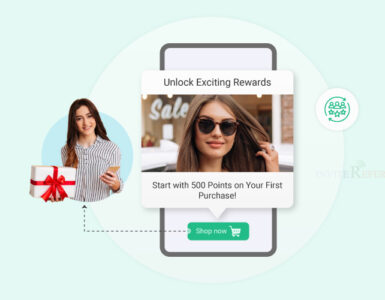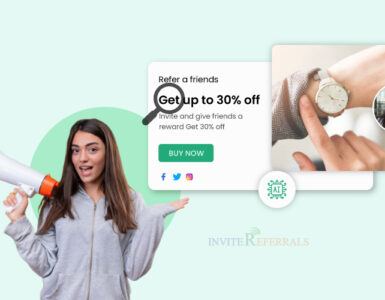Of all the sales techniques employed by businesses around the world, referral marketing is the most coveted one. It is efficient because the referred customers or referrals have already started trusting the brand and hence are easier and quicker to convert. This is why many businesses go for referral marketing. However, there is a lot of misinformation in this regard.
This blog busts seven of the most common myths about generating referrals. Debunking referral marketing myths will help businesses understand what works and what doesn’t. Thereby, they can break those hindrances on the way to successfully making referrals.
Busting 7 Common Referral Marketing Myths
By knowing what the commonly believed referral marketing myths are, you can employ the right referral marketing strategy.
1. The What of a Referral

Oftentimes, the meaning of the term “referral” itself is misunderstood. People confuse sales terminologies such as introductions, word of mouth buzz, and warm leads as referrals. However, they are not. Here is what the word “referral” actually means-
- A referral is someone who needs the solution you provide to the problem he/she is facing. And one of your contacts has referred him/her to you as an ideal solution provider.
- A connection has been established between your business and the potential customer by your contact.
These are the two identification marks of referrals. Likewise, there are many misconceptions regarding how referrals are generated. These will be busted in the following sections.
2. Referrals are inconsistent
Another referral marketing myth that most businesses believe is that you can’t completely rely on referral marketing as they are inherently inconsistent. Some brands run referral programs quite successfully. For instance, the Dropbox referral program, which gamifies its referring and incentivizing process, has gained a lot of popularity and referrals.
The Dropbox referral reward is done in a phased manner. So, referrers are rewarded on multiple instances rather than in one single go. For instance, they are incentivized on events such as sharing the brand on social media, installing the app, etc. This keeps the referrer motivated to continue advocating on the brand’s behalf.
Besides, make sure that the reward is something that they’d value. Uber did this well. When they launched themselves, they offered $20 off the next ride if they got someone to sign up with Uber. And even today, if a person uses someone’s referral code to sign up with this ride service, both the referrer and the referred would get $15 off.
3. Referral programs enable viral marketing

While some believe that referral marketing can’t bring effective results, some people believe that businesses can market themselves virally with it. We’re not saying that it isn’t possible, but we’re saying that you can’t expect viral growth with a referral program alone.
Just because you run a referral program or you ask your customers to participate in it, it doesn’t mean they will or that their referrers will join you. What we mean to say is- a brand ambassador program can’t simply replace all other marketing. It should be a part of your marketing mix.
Your referral program should add value and be complementary to your other marketing strategies like offering quality products, delivering excellent customer service, etc. Only then your customers will be willing to take part in your referral program and refer their friends and folks to you.
4. It is difficult to implement a referral program

Many a time, when you look at some of the best referral programs that other brands and businesses run, you end up thinking that it is something quite technical and far beyond your reach. You believe that it is something you can never implement on your own. This certainly is a referral marketing myth that needs to be debunked.
For, referral programs are easy to launch nowadays. Thanks to referral program software solutions like InviteReferrals. These provide an all-inclusive way to implement and manage a referral program on your site. You can find features for multi-event incentivizing, social sharing, analytics, and more in these.
5. There is no need for a formal referral program
Another common referral marketing myth is that referrals should occur naturally; brands needn’t run a referral program. Yes, people are instinctively triggered to spread the word about you around when you offer quality products and services. However, having a formal referral program motivates them to refer you to their circle.
When you run a referral program that pushes the customer to take a referring action and incentivizes them for it, they become more encouraged to do it. They also become happy that they’re able to do something for you and you’re noticing it. This cheers them up to go that extra mile to make a referral.
6. Only your customers can be your referrals

Brands and businesses resort to thinking that their customers alone can be their referrals. This is quite untrue. While customers make a major part of your referral program participants, there are also quite a lot of others who can advocate on your behalf.
Here are some other groups of people in your contact list who you can invite to refer.
- Customers of businesses that are complimentary to you. You can partner with those and request their customers to refer you around.
- Your employees, agents, and contractors. These domain experts are specifically effective if you have an enormous and geographically dispersed workforce.
- Influencers in your niche are another go-to source for generating referrals.
- Affiliates are yet another referral source. Work on an informal basis or through a private or public affiliate network.
- Business partners, both current and future, are often untapped referral sources that you can make use of. =
7. Referral marketing is time-consuming
A lot of businesses shun away from referral marketing because they assume it to be time-consuming. Time indeed is one of our most precious commodities. It’s not good to waste it. However, referral marketing is one of the business growth strategies that can widen your customer base in a time-effective manner.
For, as mentioned earlier, using a referral program tool, you can automate the process of generating referrals, incentivizing referrers and referrals, analyzing what works with your referral marketing, and more. These can easily integrate into your website or mobile app so that you can promote your referral campaigns through these channels.
Referral Marketing Myths Infographic

Bust the myths
Your contacts are your great brand advocates. There is an immense untapped opportunity in them that you should make use of. Now that we have busted the common referral marketing myths, go ahead and set up your referral program! Start generating referrals without any misconception and referral explosion is certainly possible!
















